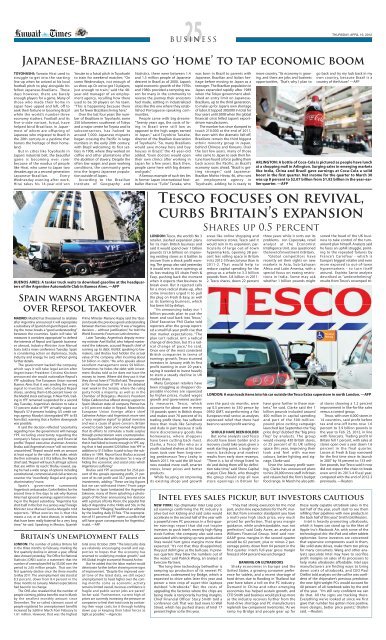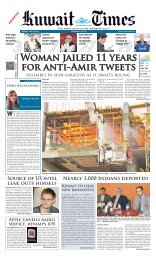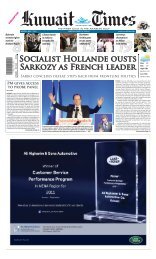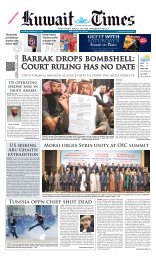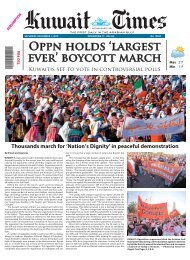Create successful ePaper yourself
Turn your PDF publications into a flip-book with our unique Google optimized e-Paper software.
TOYOHASHI: Yamato Hirai used to<br />
struggle to get into the starting<br />
line-up when he arrived at his local<br />
football pitch to play alongside his<br />
fellow Japanese-Brazilians. These<br />
days however, there are barely<br />
enough players for a game. Many of<br />
those who made their home in<br />
Japan have upped and left, off to<br />
seek their fortune in booming Brazil<br />
while the world’s number-three<br />
economy stutters. Football and its<br />
five-a-side variant, futsal, have<br />
helped bind Brazilians in Japanmost<br />
of whom are offspring of<br />
Japanese who migrated to Brazil in<br />
the 20th century-in a pastime that<br />
honors the heritage of their homeland.<br />
But in cities like Toyohashi in<br />
Japan’s industrial belt, the beautiful<br />
game is becoming ever rarer<br />
because of the exodus of people<br />
like Hirai, who came to Japan two<br />
decades ago as a second generation<br />
Japanese-Brazilian. Every<br />
Wednesday evening after work,<br />
Hirai takes his 14-year-old son<br />
Yosuke to a futsal pitch in Toyohashi<br />
to train for weekend matches. “On<br />
some Wednesdays, not enough of<br />
us show up. Or we’ve got 10 players,<br />
just enough to train,” said the 48year-old<br />
manager of an employment<br />
agency, recalling how there<br />
used to be 30 players on his team.<br />
“This is happening because there<br />
are far fewer Brazilians living here.”<br />
Over the last four years the number<br />
of Brazilians in Toyohashi, some<br />
250 kilometers southwest of Tokyo<br />
and a major centre for Toyota and its<br />
subcontractors, has halved to<br />
around 7,000. Japanese migrants<br />
began crossing the Pacific in large<br />
numbers in the early 20th century,<br />
with Brazil welcoming its first settlers<br />
in 1908, where they worked on<br />
coffee and other plantations after<br />
the abolition of slavery. Despite the<br />
often low wages and poor working<br />
conditions, the community grew<br />
into the largest Japanese population<br />
outside of Japan.<br />
According to the Brazilian<br />
Institute of Geography and<br />
BUENOS AIRES: A tanker truck waits to download gasoline at the headquarters<br />
of the Argentine Automobile Club in Buenos Aires. —AFP<br />
Statistics, there were between 1.4<br />
and 1.5 million people of Japanese<br />
descent in Brazil as of 2000. Japan’s<br />
rapid economic growth of the 1970s<br />
and 1980s provided a tempting reason<br />
for many in the community to<br />
reverse the journey their ancestors<br />
had made, settling in industrialized<br />
cities like this one where they established<br />
Portuguese-speaking communities.<br />
People came with big dreams-<br />
”Twenty years ago, the costs of living<br />
in Brazil were still low as<br />
opposed to the high wages earned<br />
in Japan,” said Toyohito Tanabe,<br />
director of the Brazilian Association<br />
of Toyohashi. “So, many Brazilians<br />
would save money here and buy<br />
houses in Brazil,” the 43-year-old<br />
added. “Even doctors would open<br />
their own clinics after working in<br />
Japan for a few years. Back then,<br />
people came here with big dreams<br />
and goals.”<br />
A famous example of such ties lies<br />
in former Japan international footballer<br />
Marcus “Tulio” Tanaka, who<br />
25 BUSINESS<br />
was born in Brazil to parents with<br />
Japanese, Brazilian and Italian heritage<br />
before moving to Japan as a<br />
teenager. The Brazilian population in<br />
Japan expanded rapidly after 1989<br />
when the Tokyo government abolished<br />
an entry limit on Japanese-<br />
Brazilians, up to the third generation,<br />
to make up for Japan’s own shortage<br />
of labor. It topped 300,000 in total for<br />
four years until 2008 when the global<br />
financial crisis felled Japan’s exportdriven<br />
manufacturers.<br />
The number has since slumped to<br />
touch 210,000 at the end of 2011.<br />
But even with the dramatic fall-off,<br />
Brazilians remain the third biggest<br />
ethnic minority group in Japan,<br />
behind Chinese and Koreans. Over<br />
the last few years, many of those<br />
who came to Japan to seek their fortune<br />
have found a force pulling them<br />
back across the Pacific, as Brazil’s<br />
economy races ahead. “Brazil is getting<br />
stronger,” said Japanese-<br />
Brazilian Michio Hirota, 46, who runs<br />
an employment agency in<br />
Toyohashi, adding he is ready to<br />
move country. “Its economy is growing,<br />
and there are jobs and business<br />
opportunities. That’s why I plan to<br />
THURSDAY, APRIL 19, 2012<br />
Japanese-Brazilians go ‘home’ to tap economic boom<br />
Spain warns Argentina<br />
over Repsol takeover<br />
MADRID: Madrid has threatened to retaliate<br />
after Argentina announced it will expropriate<br />
a subsidiary of Spanish oil giant Repsol, warning<br />
the move breaks a “good understanding”<br />
between the countries. Spain will take “all<br />
measures it considers appropriate” to defend<br />
the interests of Repsol and Spanish businesses<br />
abroad, Industry Minister Jose Manuel<br />
Soria told a news conference Tuesday. Spain<br />
is considering action on diplomacy, trade,<br />
industry and energy, he said, without giving<br />
further details.<br />
The government backed the company,<br />
which says it will take legal action after<br />
Argentinean President Cristina Kirchner<br />
announced she would nationalize Repsol’s<br />
YPF subsidiary. The European Union warned<br />
Buenos Aires that it was sending the wrong<br />
signal to investors, who dumped Repsol<br />
shares, sending them 6.06 percent lower on<br />
the Madrid stock exchange. In New York, trading<br />
in YPF remained suspended for a second<br />
day Tuesday. Argentina’s decision to take a<br />
51-percent stake of YPF virtually wipes out<br />
Repsol’s 57.4-percent holding. US credit ratings<br />
agency Moody’s downgraded YPF to B3<br />
from Ba3, warning that a further downgrade<br />
was possible.<br />
It said the decision reflected “uncertainty<br />
regarding how the government will manage<br />
YPF, including uncertainty regarding the<br />
company’s future operating and financial<br />
profile.” Repsol executive chairman Antonio<br />
Brufau said Argentina’s move “will not remain<br />
unpunished.” Repsol would seek an amount<br />
at least equal to the value of its stake, which<br />
the firm estimates at $10.5 billion, the Repsol<br />
chief said. “Repsol will launch all legal actions<br />
that are within its reach,” Brufau vowed, saying<br />
he had a wide range of options including<br />
constitutional, commercial and civil actions to<br />
counter the “manifestly illegal and gravely<br />
discriminatory” move.<br />
Spain’s government summoned<br />
Argentina’s ambassador, Carlos Bettini, for the<br />
second time in five days to ask why Buenos<br />
Aires had ignored warnings against intervening<br />
in the Repsol subsidiary. “Argentina has<br />
shot itself in the foot in a serious way,” Foreign<br />
Minister Jose Manuel Garcia-Margallo told<br />
reporters. “What worries me is that this<br />
means a cut, or at least distrust, in relations<br />
that have been really fraternal for a very long<br />
time,” he said. Speaking in Mexico, Spanish<br />
Prime Minister Mariano Rajoy said the “decision<br />
breaks the previous good understanding<br />
between the two countries.” It was a “negative<br />
decision ... without justification,” he told the<br />
World Economic Forum on Latin America.<br />
Later Tuesday, Argentina’s deputy economy<br />
minister Axel Kicillof, who helped mastermind<br />
the takeover, accused Repsol’s chief of<br />
running up its debt. Kicillof, speaking to lawmakers,<br />
said Brufau had hidden the actual<br />
value of the company, after incurring about<br />
$9 billion in debt. “He who speaks about<br />
excellent management owes $9 billion.<br />
Sometimes he hides the debt with investment.<br />
Brufau told us he does not have the<br />
money to invest. Where did they put it that<br />
they do not have it?” Kicillof said. The proposal<br />
for the takeover of YPF is to be debated<br />
next week in the Senate, where the ruling<br />
party holds a majority, as well as in the<br />
Chamber of Delegates. Mexico’s President<br />
Felipe Calderon has offered strong support to<br />
Spain. Mexican state oil company Pemex has<br />
a 9.5 percent stake in Repsol. Meanwhile,<br />
European Union foreign affairs chief<br />
Catherine Ashton said Argentina’s move sent<br />
a “very negative signal” to global investors<br />
and was a cause of grave concern. Britain<br />
vowed to back Spain and warned Argentina<br />
that its efforts to stimulate a trade surplus<br />
through protectionism were counterproductive.<br />
Repsol has denied Argentine accusations<br />
that it had failed to invest enough in YPF, saying<br />
that it had poured $20 billion into YPF in<br />
addition to $15 billion it paid to buy the subsidiary<br />
in 1999. Repsol boss Brufau accused<br />
Kirchner of taking the decision “as a way of<br />
hiding the economic and social crisis which<br />
Argentina is suffering.”<br />
Brufau said YPF accounted for 25.6 percent<br />
of the group’s operating profit, 21 percent<br />
of its net profit and 33.7 percent of its<br />
investments, adding: “These are big figures<br />
but we can withstand them.” Front page<br />
headlines in Spain lambasted the Argentine<br />
takeover, many of them splashing a photograph<br />
of Kirchner announcing her decision<br />
with a picture of Evita Peron, the populist first<br />
lady of Argentina in the 1940s and 50s, in the<br />
background. “Pillaging,” headlined an editorial<br />
by the leading daily El Pais. “The expropriation<br />
of 51 percent of YPF opens a conflict that<br />
will have grave consequences for Argentina,”<br />
it said. —AFP<br />
Britain’s unemployment falls<br />
LONDON: The number of jobless Britons fell<br />
in the three months to February, marking the<br />
first quarterly decline in almost a year, official<br />
data showed yesterday. The Office for National<br />
Statistics (ONS) said in a statement that the<br />
number of unemployed fell by 35,000 over the<br />
period to 2.65 million people. That was the<br />
first quarterly decline since the three months<br />
to May 2011. The unemployment rate stood at<br />
8.3 percent, down from 8.4 percent in the<br />
three months to January. Market expectations<br />
had been for no change.<br />
The ONS also revealed that the number of<br />
people claiming jobless benefits rose in March<br />
by the smallest monthly amount since<br />
December. The so-called claimant count of<br />
people registered for unemployment benefits<br />
increased by 3,600 in March from February to<br />
1.61 million. However, that was the highest<br />
total since October 2009. “The latest jobs data<br />
are relatively encouraging overall and supportive<br />
to hopes that the economy has<br />
returned to underlying modest growth,” said<br />
IHS Global Insight economist Howard Archer.<br />
But he added that the labor market would<br />
deteriorate further before showing more signs<br />
of improvement. “Despite the improved overall<br />
tone of the latest data, we still expect<br />
unemployment to head higher over the coming<br />
months come as economic activity<br />
remains limited overall, business confidence is<br />
fragile and public sector jobs are pared,”<br />
Archer said. “Furthermore, current high oil<br />
prices are currently increasing the pressure on<br />
companies to limit their total costs by containing<br />
their wage costs, be it through holding<br />
down pay or keeping their labor forces as<br />
tight as possible.” —Agencies<br />
LONDON: Tesco, the world’s No 3<br />
retailer, slashed expansion plans<br />
for its main British business and<br />
said it would spend over 1 billion<br />
pounds ($1.6 billion) on improving<br />
existing stores as it battles to<br />
recover from a shock profit warning.<br />
The group also said yesterday<br />
it would rein in store openings at<br />
its loss-making US chain Fresh &<br />
Easy, pushing back the moment<br />
when it expects that business to<br />
break even. But it rejected calls<br />
for a more radical shake-up, after<br />
some investors urged it to pull<br />
the plug on Fresh & Easy, as well<br />
as its banking business, which<br />
has been hit by delays.<br />
“I’m announcing today our 1<br />
billion pounds plan to put the<br />
heart and soul back into Tesco,”<br />
Chief Executive Phil Clarke told<br />
reporters after the group reported<br />
a small full-year profit rise that<br />
met market expectations. “The<br />
plan isn’t radical, isn’t a radical<br />
change of direction, but it’s a radical<br />
change of pace,” he said.<br />
Once one of the most consistent<br />
British companies in terms of<br />
earnings growth, Tesco stunned<br />
investors in January with its first<br />
profit warning in over 20 years,<br />
saying it needed to invest heavily<br />
to stem a steady decline in UK<br />
market share.<br />
Many European retailers have<br />
been struggling as shoppers’ disposable<br />
incomes are squeezed<br />
by higher prices, muted wages<br />
growth and government austerity<br />
measures. Tesco, which<br />
accounts for about one in every<br />
10 pounds spent in British shops<br />
and makes over 70 percent of its<br />
trading profit there, has suffered<br />
more than rivals like Sainsbury<br />
and Asda in part because it sells<br />
more discretionary goods like<br />
homewares, where shoppers<br />
have been cutting back most.<br />
Clarke, a Tesco lifer who as a<br />
youth stacked shelves at his local<br />
store, took over from long-serving<br />
predecessor Terry Leahy in<br />
March 2011. He said the UK business<br />
needed more staff, smarter<br />
stores, lower prices and better<br />
products.<br />
While focusing on improving<br />
its existing shops and growth<br />
areas like online shopping and<br />
convenience stores, Tesco said it<br />
would rein in its expansion, particularly<br />
of large out-of-town<br />
hypermarkets, opening 38 percent<br />
less selling space in Britain<br />
in its 2012-3 financial year than in<br />
2011-2. That would help to<br />
reduce capital spending for the<br />
group as a whole to 3.3 billion<br />
pounds from 3.8 billion in 2011-<br />
2. Tesco shares, down 22 percent<br />
over the past six months, were<br />
up 0.5 percent to 330 pence by<br />
0950 GMT, outperforming a flat<br />
European retail sector, as analysts<br />
expressed relief that there had<br />
been no second profit warning.<br />
SHOULD HAVE BEEN BOLDER<br />
But some analysts said Tesco<br />
should have been bolder and a<br />
recovery could take years given a<br />
weak starting point, a tough economic<br />
backdrop and modest<br />
results from early store revamps.<br />
“There is a lot of things listed ‘to<br />
do’ and doing them will by definition<br />
take time,” said Shore Capital<br />
analyst Clive Black, who thought<br />
the group should stop all new<br />
store openings in Britain for<br />
go back and try my luck back in my<br />
own country, because Brazil is a<br />
country of the future.” —AFP<br />
ARLINGTON: A bottle of Coca-Cola is pictured as people have lunch<br />
at a shopping mall in Arlington. Surging sales in emerging markets<br />
like India, China and Brazil gave earnings at Coca-Cola a solid<br />
boost in the first quarter. Net income for the quarter to March 30<br />
was up 8 percent to $2.07 billion from $1.92 billion in the year-earlier<br />
quarter. —AFP<br />
Tesco focuses on revival,<br />
curbs Britain’s expansion<br />
NEW YORK: Top chipmaker Intel Corp posted<br />
earnings confirming the PC industry is<br />
alive-but not kicking-and said sales would<br />
accelerate in the second half of the year with<br />
a powerful new PC processor. In a first-quarter<br />
earnings report that did not inspire<br />
investors to push Intel’s recently high-flying<br />
stock further, the company also said costs<br />
associated with ramping up new production<br />
lines would hurt gross margins more than<br />
expected. “It’s not that they disappointed,<br />
they just didn’t give us the bull case. In previous<br />
quarters they blew the numbers out of<br />
the water,” said Patrick Wang, an analyst at<br />
Evercore Partners.<br />
The long-time technology bellwether is<br />
ramping up production of its newest PC<br />
processor, codenamed Ivy Bridge, which is<br />
expected to drive sales later this year and<br />
power a new crop of super-thin laptops<br />
dubbed “ultrabooks.” But the costs of<br />
upgrading the factories where the chips are<br />
being made is temporarily hurting margins,<br />
Chief Financial Officer Stacy Smith told a<br />
conference call. That was bad news to Wall<br />
Street, which has pushed shares of Intel 17<br />
percent higher so far this year.<br />
Shares up 0.5 percent<br />
three years while it sorts out its<br />
problems. Jon Copestake, retail<br />
analyst at the Economist<br />
Intelligence Unit, also questioned<br />
the level of investment in Britain.<br />
“Global competitors have<br />
recently set their sights on new<br />
markets in Asia, Sub-Saharan<br />
Africa and Latin America, with a<br />
special focus on easing restrictions<br />
in India. Some may ask<br />
whether 1 billion pounds might<br />
have gone further in these markets,”<br />
he said. Clarke said the 1<br />
billion pounds included around<br />
400 million in capital spending<br />
and part of the 500-millionpound<br />
price cutting campaign<br />
launched last September-the “big<br />
price drop” dubbed the “big price<br />
flop” by analysts. The group<br />
would revamp 430 British stores,<br />
or 25 percent of its UK selling<br />
space this year, improving their<br />
look and feel with warmer<br />
colours, better lighting and signage,<br />
Clarke said.<br />
Since the January profit warning,<br />
Clarke has announced plans<br />
to hire 20,000 more staff in Britain<br />
and relaunched the firm’s budget<br />
food range. In March he also jetti-<br />
soned the head of the UK business<br />
to take control of the turnaround<br />
plan himself. Analysts said<br />
he faces an uphill struggle, pointing<br />
to the repeated failures by<br />
France’s Carrefour - which is<br />
Europe’s biggest retailer and even<br />
more exposed to out-of-town<br />
hypermarkets - to turn itself<br />
around. Espirito Santo analysts<br />
described as “underwhelming”<br />
results from Tesco’s revamped tri-<br />
LONDON: A man loads items into his car outside the Tesco Extra superstore in north London. —AFP<br />
“They had strong execution for the most<br />
part, and in-line expectations for the PC market.<br />
But from a investor standpoint you have<br />
a multi-year high stock price, very much<br />
priced for perfection. That gross margin<br />
guidance, while understandable, was not<br />
perfection,” said Cody Acree, an analyst at<br />
Williams Financial Group. Intel said non-<br />
GAAP gross margins in the second quarter<br />
would be 62 percent, plus or minus 2 percentage<br />
points, down from 64 percent in the<br />
first quarter. Intel’s full-year gross margin<br />
forecast of 64 percent was unchanged.<br />
BANKING ON ULTRABOOKS<br />
Shaky economies in Europe and the<br />
United States, a growing consumer preference<br />
for tablets, and a recent shortage of<br />
hard drives due to flooding in Thailand last<br />
year have taken a toll on the PC industry.<br />
Demand in China and other emerging<br />
economies has helped sustain growth, and<br />
CFO Smith said business would pick up more<br />
as the industry recovers further from the<br />
hard-drive shortage and PC manufacturers<br />
replenish low component inventories. “As we<br />
ramp Ivy Bridge and people gear up for<br />
al stores showing a 1.2 percent<br />
improvement in like-for-like sales<br />
versus a control group.<br />
Tesco, with over 6,000 stores in<br />
14 countries, said profit before<br />
tax and one-off items rose 1.6<br />
percent to 3.9 billion pounds in<br />
the year to Feb. 25, 2012, in line<br />
with forecasts. Trading profit in<br />
Britain fell 1 percent, with sales at<br />
stores open over a year down 1.6<br />
percent in the final quarter.<br />
Losses at Fresh & Easy narrowed<br />
for the first time since its launch<br />
in 2007 by 18 percent to 153 million<br />
pounds, but Tesco said it now<br />
did not expect the chain to break<br />
even until its 2013-4 fiscal year,<br />
compared with the end of 2012-3<br />
previously. —Reuters<br />
Intel eyes sales pickup, but investors cautious<br />
these really capable ultrabook sales in the<br />
last half of the year, you’ll start to see them<br />
refilling their pipelines with new products in<br />
the back half of this year,” Smith told Reuters.<br />
Intel is heavily promoting ultrabooks,<br />
which it hopes can stand up to the likes of<br />
Apple Inc’s Macbook Air, with some of the<br />
technological chic the iPad and other tablets<br />
epitomize. Some investors are concerned<br />
that expensive components used in them,<br />
like solid-state drives, make them too pricey<br />
for many consumers. Wang and other analysts<br />
speculate Intel may have to sacrifice<br />
profit margins on sales of its processors to<br />
help make ultrabooks affordable. Intel says<br />
manufacturers are finding ways to bring<br />
down costs of ultrabooks, and CEO Paul<br />
Otellini told analysts on the call he was confident<br />
of the chipmaker’s previous prediction<br />
the new light-weight PCs would account for<br />
40 percent of all notebook sales by the end<br />
of the year. “I’m still very confident we can<br />
do that. All the signs are tracking there.<br />
Everything we’ve looked at since we first<br />
gave that number has gotten more positive,<br />
more designs, better price points,” Otellini<br />
said. —Reuters


